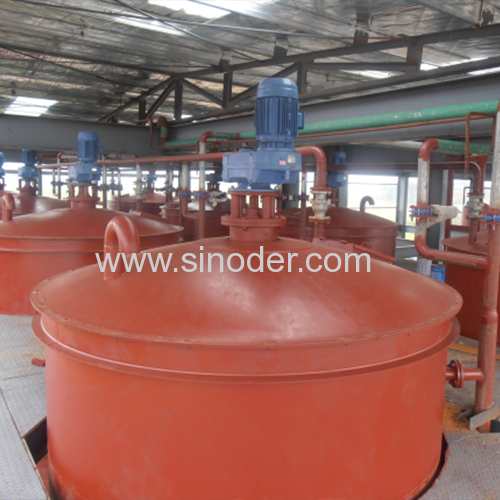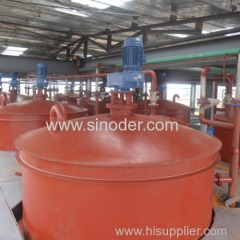Palm
kernel oil refining processing line adopts advanced and scientific
physical refining and totally stainless steel tank refining. Palm kernel
oil is non-drying oil with low gum content, which is suitable for
physical refinery. Fatty a-cid composes of 45%-51% lauric a-cid and
13%-25% cardamom a-cid. Palm kernel oil contains soap grade and food
grade.
Palm Kernel Oil Refining Plant can be done on the crude palm kernel oil
after it is extracted from the Oil Mill Plant. We manufacture and supply
the Palm Kernel Extraction Plants as well as Palm Kernel Oil Refining
Plants.

Palm kernel oil refinery plant has four main steps: degumming, dea-cidification, decolorization and deodorization. Palm kernel oil fractionation plant is for option.
Degumming and Dea-cidification in crude palm kernel oil refinery plant:
To remove solubility impurity in the crude palm kernel oil is degumming
process. Because phospholipid in a great part of solubility impurity in
the crude palm kernel oil. In cooking oil refining industry, degumming
is also called to get rid of phospholipid.
1. Heating. Crude palm kernel oil is pumped out from
the Buffer Tank. Passing through dosing system, the oil enters into the
Heat Exchanger to recover part of heat. Heat the oil to design
temperature(70°C)by Heater.
2. Add phosphoric/citric a-cid. The oil is mixed with dosed
phosphoric/citric a-cid in Mixer. Mixture of oil and a-cid enters into the
Mixer to change the un-hydrated phospholipids in oil into hydrated
phospholipids.
3. Add Alkali. Alkali is used to neutralize the crude
palm kernel oil. Quantity of alkali added is determined by the quality
of crude oil. The neutralized oil is heated to separation
temperature(90°C)and then enters into the Centrifuge to remove the
phospholipids, FFA and other impurities etc.
4. Washing. Roughly 5-10% hot water is added into the
oil to remove the residual soap in oil coming from Centrifuge. Generally
temperature of hot water is 3-5 °C higher thanthat of oil. In order to
get a more consistent washing effect, phosphoric/citric a-cid is added
in.
Mix oil and water in Mixer and heat it to 90-95 °C, then the mixture
enters into the Centrifuge to separate the residual soap and most of the
water. Water enters into the Separator to separate oil in water and
separate the oil further by outside pool.
Decolorization in crude palm kernel oil refinery plant:
The aim of decolorization is to improve the color of palm kernel oil,
and supply the eligible oil to deodorization process. So through
decolorization process, we should get the most change in the color, at
the same time, keeping the lowest loss.
1. Heating. The dea-cidified oil firstly enters into Heat Exchanger to make heat exchange.
2. Add white clay. When the dea-cidified oil has been
heated to design temperature (110°C), the oil is continuously mixed with
clay proportioned by an automatic feeding system before entering Vacuum
Bleacher.
3. Steaming. Then in time, during continuous agitation (by
steam), the main part of color bodies as well as oxidizing materials in
the oil are absorbed by the clay. After the bleacher, the oil/clay
mixture is pumped to alternatively working filters and safety filter to
remove clay in oil. The bleached oil tank is under vacuum to avoid
contacting with air and thus cause color return and affect peroxide
value of oil.
Deodorization in crude palm kernel oil refinery plant:
Deodorizer not only remove the fetid impurity, increase palm kernel oil
smoke point, make better taste, but also improve oil stability, quanlity
and chroma. At the same time, we can get rid of free fatty a-cid,
peroxide, heat-sensitive coloring matter, protein in the mucid oil cake,
polycyclic aromatic hydrocarbon, and residual pesticide residue.
The standard bleached oil enters into Heater, Heat Exchanger, and
Heater, and the oil is heated to process temperature (240-260°C).
Subsequently pump the oil to Deodorizer.
The deodorization tower is combined type: the upper is packed type to
remove odor producing components such as free fatty a-cid; the bottom is
plate type to get hot bleaching effect.
Oil from the Deodorizer enters into the condenser to recover most of the
heat and makes further heat exchange. Finally the oil is cooled to
80-85 °C by Cooler. Volatile from the deodorizing system is separated by
FFA Scrubber. The separated liquid is FFA at 40-50 °C.



